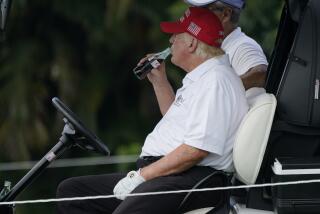Public Still Says Yes to Just Say No Campaign
- Share via
OAKLAND — The children were talking about a community cleanup, picking up trash and painting over graffiti-scarred walls, when one little girl suggested they also plant flowers.
“I never see flowers except on TV,” the girl said.
So the flowers were planted and the graffiti covered with bright pink paint, recalls Velma Arellano, regional director of the agency overseeing the project, Just Say No International.
Someone asked the young renovators what they would do if the graffiti came back.
“We’ll just paint it over again,” one replied.
“That’s the resiliency we’re looking for,” Arellano says. “You can have a household where one child does extremely well and another one doesn’t. What is it? What’s the reason? That’s what we’re looking for.”
A decade after its slogan became part of the American vernacular, Just Say No still campaigns against drugs--and still tells children they have the power to chart their own destinies.
“Just Say No has been extremely instrumental in getting the word out to young people in particular about the hazards of drug use,” says Stacey Reynolds, former executive director for the American Council on Drug Education and a consultant to the group.
“They’ve been able to get into a lot of places that a lot of other organizations have yet been unable to get into.”
The Just Say No Foundation, now Just Say No International, was incorporated in Oakland in July 1986 as a national nonprofit organization.
Just who was the first to say, “Just Say No,” is not entirely clear, says Ivy Cohen, current president of the group.
What is known is that once former First Lady Nancy Reagan got involved, paying a visit in January 1985 to a group of Oakland schoolchildren who later called themselves a “Just Say No Club,” the group took off.
“She was the catalyst to the agency’s really overnight growth into a leader in the drug-abuse prevention field,” Cohen says.
Reagan remains honorary chairwoman and from time to time helps the agency attract national support.
‘The real test for us was, once she left the White House, many people wondered--and were even skeptical--about whether or not the organization and its programs and its messages would perpetuate,” Cohen says. “I’m very proud to say that not only have they perpetuated, but the agency has continued to grow.”
In some ways the group’s famous slogan has been a mixed blessing, drawing jibes as too simplistic, Cohen says
“We’ve heard it all,” she says. “People have told me outright that this ‘Just say no’ phrase has ‘saved my child.’ Likewise, I have heard people say, ‘This is the most simplistic, hokiest phrase and slogan I’ve ever heard.’
“The people that matter the most in terms of the slogan and the name for the organization are the kids themselves. Kids connected very quickly and very closely with the phrase, ‘Just say no.’ It had a lot of meaning.”
Now 19, and a student at Spellman College in Atlanta, former Just Say No club member Claudia Jenkins remembers the slogan and the group as a fun activity that brought her into contact with some celebrities.
In particular, she remembers a rally where Nancy Reagan spoke, and the actress who played TV’s Punky Brewster was a guest.
“I was really excited, not because of Nancy Reagan, but because Punky Brewster was there,” Jenkins recalls with a giggle. “I loved Punky Brewster.”
On a more serious note, she says, being in a no-drug group helped dispel peer pressure.
“When I would hear people talking about, ‘My brother smokes weed,’ and they were kind of curious or inquisitive about it, it wasn’t anything that I was worried about or that I felt pressured like, ‘Oh, everyone else is doing it,’ because I was part of a club that had millions of children saying no to drugs.”
At its height, there were 25,000 Just Say No clubs in the United States and 12 other countries.
These days the group continues to operate the Just Say No clubs, although they have been incorporated into a new program called Youth Power. Youth Power takes a more comprehensive approach to the problems that can put a child at risk of drug use.
Nationwide, Youth Power, which has an annual budget of about $5 million, has about 200 teams in what is still a pilot project, Cohen says.
The focus of the group remains getting the anti-drug message to children before they’re tempted to start using.
“You get a kid at 13 in an inner city like Oakland, they already know about drugs,” Arellano says. “You have to get that information to them before then.”
More to Read
Sign up for Essential California
The most important California stories and recommendations in your inbox every morning.
You may occasionally receive promotional content from the Los Angeles Times.













